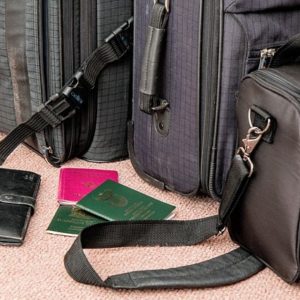 Are you staying connected to your spouse while he or she is away? One of the sayings here in the U.S. is “when the cat is away, the mice will play.” But when a SPOUSE is away, the other spouse usually finds little to nothing playful about the situation. They often feel resentful, lonely, and are tired of having the extra responsibility to run the household on their own.
Are you staying connected to your spouse while he or she is away? One of the sayings here in the U.S. is “when the cat is away, the mice will play.” But when a SPOUSE is away, the other spouse usually finds little to nothing playful about the situation. They often feel resentful, lonely, and are tired of having the extra responsibility to run the household on their own.
And when the away spouse returns, there are other adjustments to make. The returning spouse many times has expectations for them to immediately pitch in and help. It can put a real strain on a marital relationship because the other spouse has their own expectations. And having to fulfill a “to do” list isn’t usually one of them!
There ARE some marriages that can do well under these circumstances. But they seem to be those who purpose to work this situation out intentionality. A lot of times they have some kind of game plan functioning for them, which makes the best of this situation. But from what we’ve seen, these marriages are rare.
Make the Effort to Stay Connected
The important thing is that you want to have a good marriage and not just one that barely functions under these circumstances. To accomplish that, you need to make the effort so “absence really does make your heart grow fonder.”
So, to assist you in this mission of staying connected, below are some tips that you might find helpful.
Elle Kay talks about this issue in a Marriage Partnership Magazine article titled, “Staying Connected When Your Spouse is Away.” She experienced being away from her husband when he was in the military. She has been married for over 25 years to Bob Kay. He was a former Stealth fighter pilot, so many times they had to be geographically separated. Elle shares some of what she has learned, plus some from other wives, separated through the miles. Here’s one tip you might find insightful:
Before the Trip:
“Watch out for fireworks. Part of ‘Pre-separation’ syndrome is that people begin to separate themselves emotionally for what lies ahead. Look for tensions to be high. And be on guard for potential fireworks over little things. Simply being aware of these potential disagreements can go a long way toward diffusing the situation. Karen Evenson and her husband, who’s traveled frequently for 15 years, would fight about the laundry before he’d leave on trips. ‘I’d get so angry because he’d throw his underwear anywhere but in the hamper!’ Karen says. ‘We’d get into arguments about it and he’d leave the house on a sour note. Then I’d spend the time we were apart feeling guilty and miserable. I finally discovered where he puts his underwear really doesn’t matter. And that discovery has made for better partings.'”
Here’s another tip to help you stay connected:
“Keep in touch. Proverbs 25:25 says, ‘Like cold water to a weary soul is good news from a distant land.‘ Letters and e-mail are great opportunities to connect. But a word of warning: Re-read everything before you send it. This is especially true if you’re venting or feeling sad when you write. This kind of correspondence tends to be one-dimensional. It will often communicate a tone or message that you may regret once you’re in a better frame of mind. Remember to be honest and yet keep your notes as positive as possible. Allison Warner, whose husband, Jason, is stationed in Kosovo, says this: ‘One important thing I’ve learned is to vent to other people or to God instead of to Jake. While sometimes this is hard to do, it’s strengthened our relationship.'”
And keep track of the funny things you or your kids do. And then tell your spouse about them. Laughter “is as good medicine” as the Bible says. It also helps your spouse feel more like a part of the family, when you laugh together.
And then lastly here are four more tips. (FYI: there are a LOT more tips you can read by googling, “Staying Connected When Your Spouse is Away” written by Ellie Kay.)
“Four Don’ts:
• “Don’t have a negative attitude. It will hurt you, your kids, and everyone who’s unfortunate enough to be around you!
• “Don’t spend time alone with coworkers or friends of the opposite sex. Establish boundaries during this particularly vulnerable time.
– “Don’t give in to impulsive buying. It will surely add up to big debts!
• “Don’t turn down help. Accept people’s offers to take you to lunch. Go to their house for dinner, baby-sit your kids, or even bring you a casserole.”
And, if it’s the wife who is traveling, here’s an article put together by Rev. Rich. It could give you a few tips you will appreciate:
• ROMANTIC ACT OF THE DAY: While She’s Away
And then, here is a series of articles put together by the ministry of Focus on the Family deal with this same subject. To begin reading, please click onto the link below:
• DEALING WITH PHYSICAL DISTANCE IN MARRIAGE
— ALSO —
If you ask others who are going through long distance relationships, you can usually find something you can adapt to use in your own marriage. On that premise, here are some tips, given by those who know. That’s what they’re dealing with:
• ADVICE FROM PEOPLE IN LONG DISTANCE RELATIONSHIPS
In closing:
Here is some additional wise advice to seriously consider given by Dr Dana Fillmore:
“Travel can be lonely, and so can being married to a person who travels often. Since we’re all subject to feelings of loneliness, we can seek out connections with other people fairly unconsciously, and while we may think we’re simply passing the time or making a new friend, we may begin to emotionally invest in this new person – and actually damage the strength of the marriage.
“When we feel lonely or vulnerable, we may find ourselves connecting with others—especially those of the opposite gender. And while it may feel harmless, it’s setting the stage for an emotional affair (that could even lead to a physical affair). Any of us are susceptible to this. That’s why we need to be aware of the problem before we allow it to happen! You don’t have to wall yourself off from other people. But be aware of where your thoughts and feelings are headed whenever you’re interacting with someone new.
“It can be tough, definitely. But with a focus on one another and an agreement to make your marriage a priority (even if you have to be apart for periods of time), travel and distance don’t have to create problems or chip away at the integrity of your relationship. Stay connected any way you can! Stay in touch every day. And spend as much quality time together as you can. It will do wonders for you marriage!” (From the article, “How to Keep Your Marriage Safe When Your Husband Travels for Work”)
If you have additional tips you can share to help others, please “Join the Discussion” by adding your comments below.
Cindy Wright of Marriage Missions International wrote this article.
More from Marriage Missions
Filed under: Assorted Marriage Issues Communication and Conflict







When the spouse drives truck, all they do is complain about it. They have no reason to care about home until days off. That will never change.
Mary, you’re right in saying that many spouses complain about driving trucks (just as many complain about other types of work). But as far as them caring “about home” when they are away depends upon the spouse who is at home and the one who isn’t. It depends upon their intentionality to connect in healthy ways. It CAN change if the spouses involved work to make it happen. I’ve seen it change, but not without intentionality and the “heart to” make those changes.